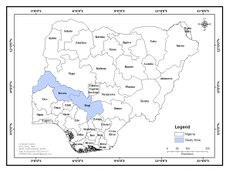
RCE Ilorin

 Overview
Overview
The Regional Centre of Expertise (RCE) on Education for Sustainable Development (ESD), RCE Ilorin comprises Kwara and Kogi States of Nigeria. The two states, located in the North-central geo-political zone of Nigeria also fall within the Lower Niger River Basin. According to the National Bureau of Statistics (2016) the two states covering a total land size of 61,180Km2 have an estimated total population of 7,666,390 (Kwara - 3,192,900; Kogi - 4,473,490). These states enjoy two main seasons in the year (dry and wet seasons), with the wet season beginning from mid-March to the end of October while the dry season commences in November and ends in March. The wet season is characterized by heavy downpours accompanied by groundwater infiltration and percolation. The rainfall per annum ranges from 1,000 to 1,500 mm with 187 to 220 mm rainy days. Monthly temperature ranges from 21C to 37C.
Kwara and Kogi States are characterized by varying landforms along the valleys of Niger and Benue rivers, with deep valleys, large hills, mountains and plateaus. The area is generally well drained. The vegetation of the RCE Ilorin is Guinea savanna and blessed with alluvial soils, which can be found on the plains or rivers or on deltas, and good for agriculture. This type of soil also has an added advantage of ensuring that planting can go on throughout the year. Also, the location of the major rivers in this zone makes irrigation relatively easy and this also results in high potentials for agricultural production. The vegetation, soil, and weather patterns are favourable for the production of a wide spectrum of arable and cash crops of various types. Agriculture and forestry are important land use activities and major components of the region’s economy. The notable crops grown in the region are maize, rice, guinea corn, yam, cowpea, citrus, oil palm, cocoa, coffee and kolanut. Cattle, sheep, goat, poultry and fish are also being produced in large number. The forestry sector also provides huge revenue for local and states government in the region through levies and taxes on timber logging.
The people in Kwara and Kogi States have common ethnic and religious backgrounds. The states also have common trade practices, livelihoods and level of literacy. Prominent ethnic groups are Yoruba, Igala, Ebira, Okun, Nupe, and Baruba. The indigenes of the region are some of the politically enlightened people in Nigeria and are presently in the mainstream in the development of the Nigerian economy. The states in the candidate RCE Ilorin are within a geographical zone which shares some peculiarities such as boundaries, agricultural productions and educational attributes as well as various cultural affiliations. The major towns in the region include Ilorin, Offa, Omu-Aran (in Kwara State); Lokoja, Okene, Kabba (in Kogi State).
The region has some peculiarities that are common to the geographical area. Such peculiarities include high rate of poverty among the populace, food insecurity, low level of education, gender inequality, inadequate access to water, poor sanitation, and environmental degradation.
The region has several established and highly rated universities like the University of Ilorin (one of the highly ranked universities in Nigeria) where the Secretariat of the candidate RCE is being hosted. Other institutions of higher learning in the region include Kwara State University, Malete; Al-Hikmah University, Ilorin; Landmark University, Omu-Aran; Summit University, Offa; Kogi State University, Ayigba; Federal University, Lokoja; and Salem University, Lokoja. There are other institutions like Nigerian Inland Waterways Authority (NIWA), Lokoja; Agricultural and Rural Management Training Institute (ARMTI), Ilorin; Micheal Imodu Institute of Labour, Ilorin; Nigerian Stored Products Research Institute (NSPRI), Ilorin; and Lower Niger River Basin Development Authority, Ilorin.

(Photo source: RCE Ilorin)
The goals are to:
i. empower communities to take ownership of development initiatives through participatory engagements;
ii. promote healthy and conducive natural ecosystems and the built environment;
iii. promote improved access to safe and sufficient water supply and sanitation in the region;
iv. engage policy makers to ensure participatory governance that includes the contribution of the majority of the citizens;
v. develop model projects to demonstrate best practices in land and resources management; and
vi. advocate for curriculum re-design in our educational institutions towards sustainable education that addresses local relatives with state-of-art technologies.
The specific objectives are to:
i. strengthen relevant institutions in the design, implementation, monitoring and evaluation of need-driven development initiatives;
ii. carry out advocacy and enlightenment campaigns on improved green urban and peri-urban environments in the region;
iii. encourage communities to improve carbon sequestration through innovative tree planting campaigns;
iv. encourage responsible consumption, proper waste management, and pollution control in the communities;
v. collate data on access to safe and sufficient water in communities within the region;
vi. maintain an up-to-date database on water-related development partners in the region;
vii. facilitate partnerships among stakeholders (governments, development partners and communities) towards provision and attainment of universal access to safe and sufficient water supply;
viii. advocate for improved watershed protection and management;
ix. facilitate improved access to household-level environment services;
x. advocate for voter’s right and promote stakeholders’ mobilization;
xi. promote gender equity in governance;
xii. propagate community-based alternative dispute resolution (ADR) techniques for preventing and managing conflict;
xiii. identify knowledge gaps between the existing curricula and sustainable education within the region;
xiv. determine knowledge areas for sustainable education in comparison to global best practices;
xv. carry out capacity building in the theme areas for effective delivery of sustainable education; and
xvi. advocate for inclusion of a broad-based stakeholders in governance issues.
Name of organisation:University of Ilorin, Ilorin, Nigeria
Type of organisation: Higher Education Institution
Name of organisation:Agricultural and Rural Management
Training Institute (ARMTI), Ilorin
Role: Partner
Contact name:
Contact email:
Name of organisation:Lower Niger Basin Development Authority, (LNRBDA) Ilorin
Role: Partner
Contact name:
Contact email:
 Activities
Activities
-
Activity 1
Engaging the Students within the catchment of the RCE Ilorin to stimulate their interest in forming voluntary organizations on campuses, to promote environmental stewardship and reduce cost of waste management, energy and water. -
Activity 2
Mainstreaming Sustainable Development into the academic curricula at the University of Ilorin. -
Activity 3
Policy makers and stakeholders’ advocacy meeting on knowledge and commitment to Sustainable Development Goals.
-
Activity 1
Annual Sustainable Development Goals Conference and Awards. -
Activity 2
Awareness campaign as well as the production of appropriate sustainable development toolkits and guides for stakeholders as applicable. -
Activity 3
Planning and designing of mechanisms that will increase the capacity for resilience among communities within the region to economic shocks.
- 1st Sustainability Colloquium with the theme, “Sustaining Our Roads: The Need for Open Spaces” held at the University of Ilorin Auditorium on 25th May 2016
- Stakeholders’ Roundtable meeting on Child Labour in Nigeria entitled, “The Menace of Street Hawking”, held at the University of Ilorin Auditorium on 27th April, 2017
- Contribution of chapter entitled, “Sustainable Development in Nigeria: Prospects and Challenges” to the General Studies (GNS 212) Course Content at the University of Ilorin, Ilorin, Nigeria.
- Sensitization outreach event, entitled, “Charcoal Production: Burning for Sustainability” on Thursday, 26th July, 2018 at Bode Sa’adu, Moro Local Government Area, Kwara State, Nigeria.
- Workshop with the theme, “Water Sustainability” held on 11th September, 2019 at the Department of Geology Lecture Theatre, University of Ilorin.
- 2nd Sustainability Colloquium entitled, “Greening Universities: Transforming University of Ilorin into a Green and Sustainable Campus organized by RCE Ilorin at the University of Ilorin Auditorium Basement on 14th July, 2021
 Communication Channels
Communication Channels
 Contact Details
Contact Details
tunjilaw@unilorin.edu.ng
abdulkareem.no@unilorin.edu.ng
RCE Ilorin, Multipurpose Hall, University of Ilorin
P.M.B. 1515, Ilorin, Kwara State, Nigeria



